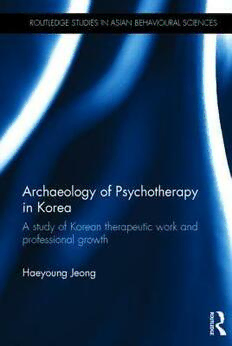
Archaeology of Psychotherapy in Korea: A Study of Korean Therapeutic Work and Professional Growth PDF
Preview Archaeology of Psychotherapy in Korea: A Study of Korean Therapeutic Work and Professional Growth
Archaeology of Psychotherapy in Korea This is the first book in English dedicated solely to the historical development of psychotherapy in Korea. It is an archaeological research of literature relating to the care and treatment of mind in Korean history in dialogue with spiritual, philosophical, cultural, social, and medical perspectives. It reviews the evolution of different approaches on mental illnesses covering autochthonous practices, psychiatry, clinical psychology, counselling, Western psychotherapy, and Korean psychotherapy. Archaeology of Psychotherapy in Korea inspects: • Folk treatment • First psychiatry • Influence from clinical psychology • Counselling development • Implementation of Western psychotherapy • Shaping of Korean psychotherapy. Its discussion engages firmly with the Korean culture and perspective while acknowledging various extrinsic influences and the fact that Korean psychotherapy continues to evolve in its own unique manner. It aims to refine the understanding of psychotherapy development in Korea in connection with its historical and social backgrounds, and to interpret a way to highlight the culturally relevant psychotherapy that is more suitable as a Korean psychotherapy better attuned to the distinct cultural and societal expectation of Korea. Haeyoung Jeong is a psychotherapist and art therapist. She received her doctorate in Psychotherapy Sciences from the Sigmund Freud University, Vienna. Routledge Studies in Asian Behavioural Sciences Series Editor: Lo Tit Wing, City University of Hong Kong Archaeology of Psychotherapy in Korea A study of Korean therapeutic work and professional growth Haeyoung Jeong Archaeology of Psychotherapy in Korea A study of Korean therapeutic work and professional growth Haeyoung Jeong First published 2015 by Routledge 2 Park Square, Milton Park, Abingdon, Oxon OX14 4RN and by Routledge 711 Third Avenue, New York, NY 10017 Routledge is an imprint of the Taylor & Francis Group, an informa business © 2015 Haeyoung Jeong The right of Haeyoung Jeong to be identified as author of this work has been asserted by her in accordance with sections 77 and 78 of the Copyright, Designs and Patents Act 1988. All rights reserved. No part of this book may be reprinted or reproduced or utilised in any form or by any electronic, mechanical, or other means, now known or hereafter invented, including photocopying and recording, or in any information storage or retrieval system, without permission in writing from the publishers. Trademark notice: Product or corporate names may be trademarks or registered trademarks, and are used only for identification and explanation without intent to infringe. British Library Cataloguing in Publication Data A catalogue record for this book is available from the British Library Library of Congress Cataloging in Publication Data Jeong, Haeyoung, author. Archaeology of psychotherapy in Korea: a study of Korean therapeutic work & professional growth / by Haeyoung Jeong. p. ; cm. I. Title. [DNLM: 1. Mental Disorders—therapy—Korea. 2. Psychotherapy— history—Korea. 3. History, 20th Century—Korea. 4. History, 21st Century— Korea. WM 11 JK6] RC480.5 616.89′1409519—dc23 2014021399 ISBN: 978-1-138-79380-4 (hbk) ISBN: 978-1-315-76085-8 (ebk) Typeset in Times by Book Now Ltd, London Dedicated to the people on the Sewol ferry and to families and friends affected by the incident This page intentionally left blank Contents List of illustrations ix Foreword xi Chronology of events xv Introduction 1 1 Korean mental geography 4 Korean ethos 4 Korean pensées 11 2 Korean philosophy 25 Cheon-Ji-In 25 Pungryu 28 3 Folk treatment 39 Autochthonous practices 39 Mudang and Kut 42 Folk-psychical approach 47 4 First psychiatry 56 Introduction of Western psychiatry 56 First Korean psychiatrists 61 Reconstruction of Korean psychiatry 63 5 Influence from clinical psychology 71 Introduction of psychology: 1910s–1945 71 Early development of clinical psychology: 1946–1970s 73 Expansion of clinical psychology: 1980s– 79 viii Contents 6 Counselling development 82 Early counselling psychology: 1950s–1970s 83 Counselling development: 1980s– 84 School counselling 87 Pastoral counselling 91 7 Implementation of Western psychotherapy 95 Psychoanalytic psychotherapy 96 Humanistic psychotherapy 106 Cognitive behavioural therapy 109 Expressive arts therapy 111 8 Shaping of Korean psychotherapy 115 Taopsychotherapy 116 Seon psychotherapy 124 Conclusion 134 Glossary 142 Index 144 Illustrations 1.1 Pungmul, at Naju, 1976 10 1.2 Danwon Kim Hong-Do ‘Mudong’, around 1789 11 1.3 Bojo-Jinul 보조 지눌 (1158–1210) 14 1.4 Rock-carved Bodhisattva in half lotus position (신선암마애보살반가상) at Sinseonam Hermitage in Gyeongju, around the eighth century © 2011 Eggmoon 15 1.5 Jesa © 2006 pcamp 17 1.6 Jandaehyun Church, at Pyungyang, 1900 21 2.1 Cheon-Bu-Kyung: an example found in the posthumous collections of Nongeun Jo Won-Kil, a scholar of the late Goryeo Dynasty (around 1328–1392) 25 2.2 Choe Chi-Won 29 2.3 Choi Si-Hyung 33 2.4 Ham Seok-Heon (left), his teacher Yu Young-Mo (right) © 2008 Ssialsori 35 2.5 Ham Seok-Heon 36 3.1 Tal-nori 41 3.2 Tal-nori at Andong © 2008 Koreanet Korean Culture and Information Service 41 3.3 Mudang and Kut © 2010 Splashman 43 3.4 Hyewon Shin Youn-Bok ‘Munyeo-shinmu’, around 1805 45 3.5 Heo Jun 50 3.6 Dongui-Bogam 51 3.7 Lee Jei-Ma 52 4.1 Jejung-won, 1885–1904 57 4.2 The Severance Hospital and Medical School; students and staff at the Severance, 1904 59 4.3 Kim Sung-Hi 66 4.4 Rhee Dong-Shick 67 4.5 Yu Seok-Jin 68 4.6 Lee Jung-Seob 이중섭 (1916–1956) ‘Ox 소’ 69 5.1 Lower grade girls, Ewha Haktang, 1908/1922 © 2014 University of Southern California 71
